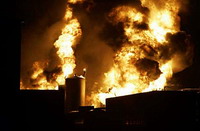Energy giant BP PLC wants to keep former top executive from being questioned in lawsuits over deadly plant explosion
Energy giant BP PLC hopes to keep its former top executive from being questioned in lawsuits over a deadly plant explosion 2 1/2 years ago.

Attorney Brent Coon, representing workers injured in the blast at the London-based oil company's refinery in Texas City, wants to ask former CEO Lord John Browne about his knowledge of the accident.
Coon contends Browne has unique knowledge about budget cuts, oversight of the refinery and other decisions that contributed to equipment failures at the plant southeast of Houston and caused the March 2005 explosion that left 15 people dead and more than 170 injured.
A state district judge ruled a year ago Browne could be deposed. A state appeals court in February upheld that ruling but BP took the case to the Texas Supreme Court.
BP attorney Katherine Mackillop argued Thursday that Browne is protected by a rule that shields corporate officials from harassment and unnecessary depositions when they do not have unique knowledge related to a case.
Coon, however, contended that before the accident Browne made it a point to review reports about the Texas City refinery, ordered budget cuts in 1999 that helped reduce safety at the facility and made countless public statements about the accident.
Browne was simply acting as any CEO would after such an accident when he visited the refinery immediately after the explosion and made public comments, Mackillop said.
"Is there evidence that Mr. Browne prior to the accident paid special attention to the Texas City refinery with regard to safety?" Chief Justice Wallace Jefferson asked.
"There is a question about that," Mackillop replied. "Let's say it's true. The fact a CEO is receiving a report on Texas City separately doesn't give him any particular special knowledge about Texas City."
Mackillop repeatedly was asked by the justices why Browne still merited protection from depositions when he no longer worked for BP.
Browne stepped down in May - more than a year ahead of a previously announced retirement date. His departure came after a series of high-profile mishaps involving the energy company as well as his disclosure that he lied to a judge when he tried to block a British newspaper from printing allegations of wrongdoing made by a former boyfriend.
Mackillop said the protection still extends to Browne because he is again a corporate official. Last month Browne took a CEO-type job with a private equity firm, she said.
"How long should does this cloak of protection follow him?" Justice David Medina asked.
The justices repeatedly asked Coon what new and unique information Browne could provide that would benefit plaintiffs whose cases have not been settled.
"It sounds like you got a great case," Justice Scott Brister said. "Why do you need the CEO?"
More than 1,350 lawsuits filed since the accident have been settled but more than 1,000 lawsuits are still pending. Coon's firm represented several hundred cases but is now down to about 20.
No lawsuit has been decided by a jury. Last month in the middle of the first civil trial stemming from the blast, BP settled lawsuits filed by four injured workers represented by Coon.
No timetable was given for a court ruling on Thursday's arguments.
Exxon Mobil Corp., along with the Texas Oil and Gas Association and several other business groups, filed a brief in support of BP, arguing such depositions would have severe repercussions on corporate management and would discourage companies from moving their operations to Texas.
Before the case was argued in court, several labor and advocacy groups held a news conference outside the courthouse asking the justices to allow Browne's deposition.
Browne "has to face the music for the decisions that he made," Coon said after the hearing, adding he is aware the Texas Supreme Court has a pro-business reputation.
The explosion at the plant, about 40 miles (64 kilometers) southeast of Houston, occurred after a piece of equipment called a blowdown drum overfilled with highly flammable liquid hydrocarbons.
The excess liquid and vapor hydrocarbons then were vented from the drum and ignited as the isomerization unit - a device that boosts the octane in gasoline - started up. Alarms and gauges that were supposed to warn of the overfilled equipment did not work properly.
The U.S. Chemical Safety and Hazard Investigation Board, one of several agencies that probed the accident, found BP fostered bad management at the plant and that cost-cutting moves by BP were factors in the explosion.
Subscribe to Pravda.Ru Telegram channel, Facebook, RSS!


